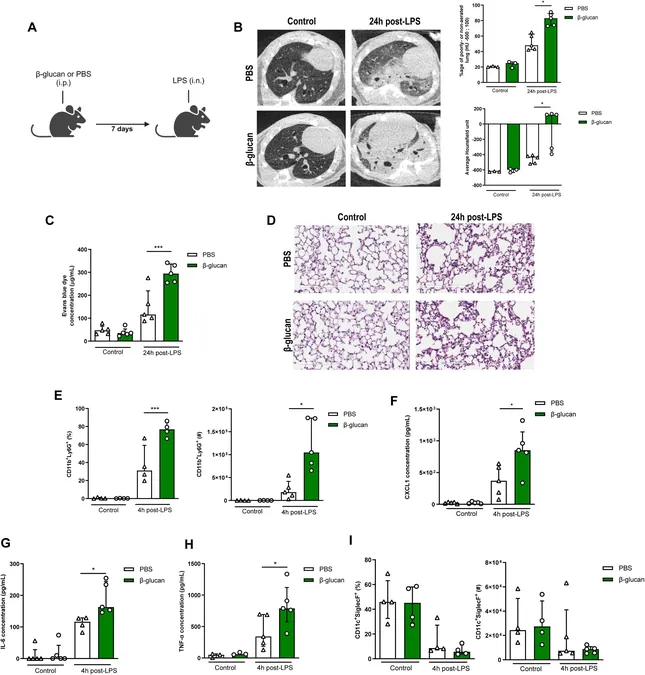
Revealing the Hidden Dangers: How a Common Fungal Molecule Triggers Lung Immunity Catastrophes!
2025-07-08
Author: Arjun
Recent research has unveiled shocking insights into how exposure to a common fungal molecule can dramatically change lung immune cells, leading them to dangerously overreact to infection signals and exacerbate lung damage.
Published in the esteemed journal eLife, this groundbreaking study sheds light on the intricate phenomenon of maladaptive trained immunity. Expert reviewers endorse the findings as highly significant, making this research a must-read for both scientists and healthcare professionals.
But what exactly is trained immunity? Simply put, it’s a form of long-lasting memory within our innate immune system—the body’s initial combatants against infections. Unlike the adaptive immune system that learns specific pathogens, trained immunity boosts the general responsiveness of innate immune cells, thanks to profound changes in their gene expression and metabolic processes.
While researchers have been exploring trained immunity as a means to enhance protection through vaccines, this new evidence suggests that it can also spiral out of control and have detrimental effects in specific situations.
Fungal Molecule Exposed: The Role of Beta-Glucan!
Alveolar macrophages, the frontline immune defenders residing in the lungs, play a pivotal role in lung health by clearing pathogens and debris. The familiar fungal molecule, beta-glucan, is known to induce trained immunity in bone marrow, where it prompts stem cells to generate more reactive immune cells.
Lead researcher Renaud Prével and his team aimed to test if beta-glucan could trigger similar immune training in alveolar macrophages—and whether this would result in a beneficial or harmful response.
Experiment Breakthrough: A Dose of Beta-Glucan!
The team administered a single dose of purified beta-glucan to mice and later exposed them to bacterial and viral infection mimics, leading to significant lung inflammation and damage. Astonishingly, the beta-glucan-treated mice exhibited much worse lung injuries compared to control groups.
High-resolution scans revealed more areas of poor aeration and thicker alveolar walls filled with inflammatory signs. Interestingly, while the number of alveolar macrophages did not change, their behavior transformed dramatically—they became hyper-inflammatory and attracted more neutrophils, worsening inflammation.
The Mystery Unraveled: How Does this Happen?
To confirm the role of alveolar macrophages in heightened inflammation, researchers selectively depleted these cells, preventing the excessive lung damage when exposed to the mimics. Even more revealing, transferring trained macrophages into mice lacking their own led to the same intense inflammatory response, proving that beta-glucan reprogramming makes lasting changes to these cells.
The research team delved deeper by utilizing gene sequencing and metabolic profiling to understand the mechanism behind this transformation. They discovered that trained alveolar macrophages displayed altered immune gene expressions and heightened energy metabolism—hallmarks of trained immunity.
A Surprising Twist: The Role of Interferon-Gamma!
Perhaps the most surprising aspect of the study was that this reprogramming did not rely on the usual receptor for beta-glucan or type I interferons. Instead, it hinged on the presence of interferon-gamma, a signaling molecule often generated during infections, alongside neutrophils.
Blocking either of these factors prior to exposure to beta-glucan halted the training process in alveolar macrophages.
A Dynamic Immunity: Implications for Lung Health!
Senior author Maziar Divangahi concluded that the dynamics of lung immune memory are more complex than previously recognized. Alveolar macrophages can be trained by systemic signals, leading to potential harm under certain circumstances.
This research could help explain why some individuals suffer from severe lung inflammation, particularly in critical situations like sepsis, underscoring the need for a deeper understanding of our immune systems!






 Brasil (PT)
Brasil (PT)
 Canada (EN)
Canada (EN)
 Chile (ES)
Chile (ES)
 Česko (CS)
Česko (CS)
 대한민국 (KO)
대한민국 (KO)
 España (ES)
España (ES)
 France (FR)
France (FR)
 Hong Kong (EN)
Hong Kong (EN)
 Italia (IT)
Italia (IT)
 日本 (JA)
日本 (JA)
 Magyarország (HU)
Magyarország (HU)
 Norge (NO)
Norge (NO)
 Polska (PL)
Polska (PL)
 Schweiz (DE)
Schweiz (DE)
 Singapore (EN)
Singapore (EN)
 Sverige (SV)
Sverige (SV)
 Suomi (FI)
Suomi (FI)
 Türkiye (TR)
Türkiye (TR)
 الإمارات العربية المتحدة (AR)
الإمارات العربية المتحدة (AR)